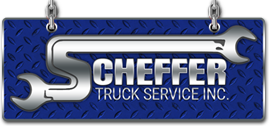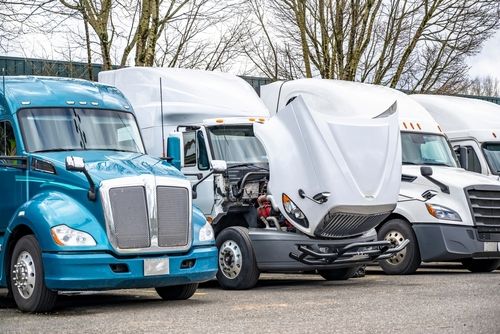Big rig engines are the heart of heavy-duty trucks, designed for endurance, power, and efficiency. Whether you’re an owner-operator or managing a fleet, understanding the differences between major truck engine types, their performance characteristics, and proper maintenance can significantly impact your operational costs and vehicle longevity. Let’s dive into some of the most common big truck engines that are serviced here at Scheffer Truck Service and what sets them apart.
Common Big Truck Engine Types
1.Inline-Six Diesel Engines
Most Class 8 trucks run on inline-six diesel engines due to their balance of power, efficiency, and durability. Some of the leading manufacturers include Cummins, Detroit Diesel, Volvo, and PACCAR. These engines are widely used because of their ability to handle heavy loads while maintaining fuel efficiency.
Key Characteristics:
- Simple design with fewer moving parts than V-configurations
- Excellent torque and fuel efficiency
- Easier access for maintenance and repairs
Performance Differences:
Inline-six engines provide smooth power delivery, reducing stress on drivetrain components. They are optimized for long-haul applications, making them a staple in freight and logistics.
Maintenance & Repairs:
- Regular oil changes every 25,000-50,000 miles, depending on engine type and oil quality
- Turbocharger inspections to prevent lag and loss of efficiency
- Valve adjustments to ensure proper compression and fuel combustion
- Diesel particulate filter (DPF) cleaning to comply with emissions standards
2.V8 Diesel Engines
Although not as common as inline-six engines in big trucks, V8 diesel engines are still used in some heavy-duty applications, particularly in vocational trucks and older models.
Key Characteristics:
- Higher power output, suited for off-road and heavy-haul applications
- More complex engine design with additional moving parts
- Typically, heavier and consumes more fuel than inline-six engines
Performance Differences:
V8 engines offer increased horsepower, making them ideal for applications that demand brute force over long-distance efficiency. However, the additional components can lead to higher maintenance costs.
Maintenance & Repairs:
- Increased wear on components due to higher stress levels
- More frequent oil changes required compared to inline-six engines
- Greater likelihood of overheating if cooling systems aren’t maintained properly
- Higher costs associated with turbocharger and injector repairs
3. Natural Gas Engines
With a growing push for sustainability, natural gas engines (CNG and LNG) are becoming more popular in the trucking industry. Companies like Cummins Westport lead the market with natural gas-powered options.
Key Characteristics:
- Lower emissions compared to diesel engines
- Quieter operation and reduced vibration
- Requires specialized fueling infrastructure
Performance Differences:
Natural gas engines provide sufficient power for regional hauls but may lack the torque required for heavy long-haul trucking. Their fuel efficiency can be beneficial in certain fleet applications, but range limitations and refueling infrastructure can be challenges.
Maintenance & Repairs:
- Requires high-pressure fuel tank inspections
- Spark plugs and ignition system components need frequent replacement
- Less carbon buildup compared to diesel engines, leading to cleaner operation
- Lower fuel costs but higher upfront vehicle investment
4. Hybrid & Electric Truck Engines
The emergence of hybrid and fully electric big rigs, such as Tesla’s Semi and Freightliner’s eCascadia, is paving the way for a greener future in trucking.
Key Characteristics:
- Zero emissions for fully electric models
- Instant torque delivery and smooth acceleration
- High battery costs but lower long-term fuel expenses
Performance Differences:
Electric trucks provide excellent torque and acceleration but are currently limited by battery range and charging infrastructure. Hybrid models offer a balance between fuel efficiency and traditional diesel power.
Maintenance & Repairs:
- Battery health monitoring and replacement planning
- Regenerative braking system inspections
- Less maintenance required due to fewer moving parts compared to combustion engines
- Infrastructure and charging availability remain key considerations
Keeping a Big Rig Engine Running Efficiently
Regardless of the engine type, following best practices for maintenance ensures maximum longevity and reliability. Here at Scheffer Truck Service we offer a wide range of maintenance services to keep your fleet hauling for the long-run.
Essential Maintenance Tips:
- Regular Oil and Filter Changes: Keeps the engine lubricated and prevents wear.
- Cooling System Checks: Overheating is a leading cause of engine failure.
- Fuel System Inspections: Contaminated fuel or clogged filters reduce efficiency.
- Turbocharger and Exhaust Maintenance: Prevents power loss and ensures emissions compliance.
- Software Updates and ECM Tuning: Modern engines rely on electronic controls to optimize performance.
Invest in Preventative Maintenance at Scheffer Truck Service
Choosing the right engine for your truck or fleet depends on the application, expected mileage, and maintenance capabilities. Whether opting for a tried-and-true inline-six diesel, a powerful V8, a clean-burning natural gas engine, or an electric alternative, proper upkeep is key to keeping big rigs on the road for years to come. By investing in preventive maintenance at Scheffer Truck Service and staying informed on advancements in engine technology, you can ensure reliable and cost-effective operation in your trucking business.

